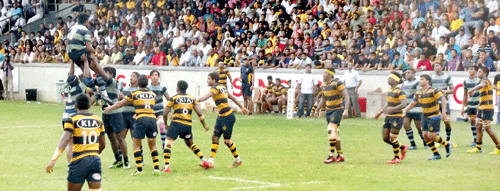The old order changeth yielding to the new
View(s):
The Royal coaching staff, keenly observing a game played against Wesley this season - File pic
The reign of Sanath Martis as head coach of Royal is over. He led Royal to a glorious 2017 season, winning the Schools League as well as the coveted Bradby Shield. Dushanth Lewke, who was his assistant, will succeed him, as revealed by sources close to Royal College. Lewke is a product of the early 1980s and is typically a starting millennial or, what is known as the ‘Y’ generation. The schools players of 2018 belong to the end birth years of the ‘Y’ generation.
With the somewhat dramatic exit of Martis, the entry of Lewke heralds a new generation of Rugby coaches.
As explained by a former Rugby captain of Royal, much involved in the game at school, the combination of Martis and Lewke was lethal. Martis, as speculated in the media, is looking out for a new challenge. Tongues are wagging in giving reasons for the exit. On the other hand, the fraternity should be happy that the former assistant of the Royal Coaching staff is taking over.
Royal won the League but, if there was an award similar to that of “Man of the Match”, it should go to giant killers, St. Peters, who stooped Trinity and Isipathana, who were a major challenge in the early stages. The brigade by the canal is, however, not satisfied with the overall performance of the team, and coach Colin Dinesh is to be replaced by Martis, to return and guide the school. Martis is also expected to guide Havelocks during the Club season, while Nilfer Ibrahim will look after the Army and his brother Ronnie will settle with the Air Force. Pathana had advertised for a coach, complementing the merry-go-round of Rugby coaches.
 Lewke has a challenge, to keep intact the solid performance of 2017. What is more important for the era and the game overall is that, the new generation of coaches fitting into the scene. This is a generation who are more tech savvy and able to use technology in the coaching regime. What does this mean to the ‘Y’ generation?
Lewke has a challenge, to keep intact the solid performance of 2017. What is more important for the era and the game overall is that, the new generation of coaches fitting into the scene. This is a generation who are more tech savvy and able to use technology in the coaching regime. What does this mean to the ‘Y’ generation?
Writings suggest the millennial athletes want to be friends with those in their team, they want to connect with their coaches but, at the same time, they may lack the desire for a significant commitment to others. It’s also no secret that, the Millennial are untrusting of authority figures. They have seen authority figures behaving poorly all round us, and they don’t see them as inspirational. So why would they trust them? This can create issues because, a coach is also perceived as an authority figure. Millennial don’t want to be told what to do. They want to be involved in the process; they want sport and life integration. The challenge ahead is tremendous for Rugby Sri Lanka.
Research shows that the No.1 reason people leave sports is because they no longer enjoy it? Millennial athletes want to have fun. Actually, it’s more important to them than winning medals. If it’s not fun, it’s not done. Sport must be enjoyable or, they will leave. The Millennial athletes also seek meaning in what they do. They connect best to values and perform best when they are aligned to their teams’ values. This is a generation that is less inclined to accept a job just because it pays well. They want a job that has meaning and a deep sense of connection, community and values. It’s no different when it comes to their sports and their team. Coaches need to ask, what does our team stand for? What do they connect to? Why would athletes want to play Rugby?
According to Jordan Kaplan, Associate Managerial Science Professor at Long Island University, Brooklyn, New York, “Millennial are much less likely to respond to the traditional command-and-control type of leadership. They’ve grown up questioning their parents, now they are questioning their coaches. They don’t know how to sit quietly, which is great, but that’s aggravating to the baby boomers (generation ‘X’) who say do it and do it now.”
The case of Sri Lanka and the future of Rugby need to look at the Millennial carefully. Will the continued push strategy continue to work? Will the expectation of the school, parents and old boys continue to draw and encourage this generation to achieve what the previous generations, including generation ‘X’ and those before, want to achieve?
How long will the attitude to plan to win supplementing from elsewhere, as well as substituting enhancements to compensate work? Can the backers of Rugby live the next few years hoping their expectations will be fulfilled, adding the mantra of being passionate and attached to the history of the school and or club. That is the challenge ahead just not for next year and or, the year after, as the generation who are tech savvy, independent, as well as forming their set of values, may not accept the push their generation was used to. The plus point will be that sponsors can see Rugby as an exciting game that can attract the millennial, where it is a bed to launch their brands.
That is where the advent of Lewke has to be seen with assurance and a waving hand for others to follow. That will not be people who have played Rugby only, but have a different psychosocial background to talk to this generation. The tell aspect and being learner centered has been the core of world Rugby education in the last few years. My experience shows Lewke is for this generation, as I saw him as a keen student studying Neuro-linguistic programming with a learning attitude, to apply the technique to Rugby coaching.
- Vimal Perera is a former Rugby Referee, coach and Accredited Referees Evaluator IRB


